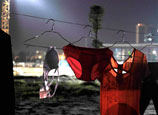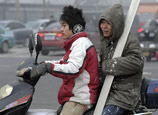
CHANGCHUN, May 21 (Xinhua) -- When businesswoman Hu Yanping made her fortune, she spent heavily to build a welfare home for the dozens of mentally handicapped people she had brought under her care over the years.
Hu lavished 4 million yuan (652,400 U.S. dollars) on the nursing home in the suburbs of Jiutai City in northeast China's Jilin Province. The complex consists of bedrooms and a restaurant, a reading room and entertainment facilities.
Since it opened in 2010, the home has accommodated more than 50 people, mostly homeless, mentally disabled children who were unable to attend school or earn a living.
Hu, 40, has also financed schooling and technical training for the elder children who are keen to learn. More than 10 of them are now able to earn a living and have moved out to start a new life.
Today, 34 people are still under this benefactor's care. The youngest is five and the oldest is 70.
Hu, a native of Jilin's provincial capital Changchun, is from a peasant family and began eking out a living at 17.
"My first job was selling porridge, pickles and snacks at a stall near the city's railway station," she told Xinhua in an interview on Monday.
One day in 1992, a vagrant passed her stall, inspiring a split-second decision that changed her life. Without hesitation, she took him home and still cares for him today.
Hu's business kept expanding in the 1990s and her shabby stall became a restaurant. Vagrant children, most of whom were mentally handicapped and wandered near the railway station, would beg her for food, as they knew she was kind and would not turn them away.
Hu's restaurant ended up as a free canteen for the vagrants, something which many of her friends and relatives took as a cause for complaint. "I can afford it," she would say to appease them every time.
"My own economic condition was better off then, but they were so miserable. I felt content to be able to do something for them," she explained. "Though I could not help them out altogether, I could at least fill their stomachs."
Hu got married in 2000 and gave birth to a boy the next year. The baby, however, was born with Down's syndrome and survived only for seven months.
It was another six months before she had begun to recover from the blow. As her business resumed, she felt even closer to those unfortunate children wandering near her restaurant. "I felt I must do something for them. Had my son been alive, he might have been just like them," she said.
Hu began taking the vagrant children home. She took home a boy who rummaged in the garbage bin for food, a girl who suffered a broken arm and could not find her way home, and dozens more who dropped in at her restaurant begging for food.
These youngsters found salvation in a woman who poured out all the love she had reserved for her deceased son. "In fact, these children are all simple, honest and grateful. I feel very happy when they try to repay my kindness," Hu said.
In 2010, she had built up several businesses including her restaurant chains, a supermarket and a guest house. She felt it was crucial to create better conditions for the kids to live and learn to make a living. "So I bought some land in Jiutai City and had this nursing home built."
The children all adore her. Many tried to cut short Xinhua's interview as it was time for dinner and her dishes were getting cold.
Hu's employees all willingly help her take care of the young charges. "In the beginning, I felt she was going too far, spending so much of her hard-won money to support complete strangers," said Ge Cailing, a waitress at Hu's restaurant.
Today, though, Ge has come to love the children too.
On sunny days, Hu takes them out to a clearing which she has turned into farmland. Together, they grow fruit and vegetables.
Some of the children attend the local primary school and learn to read and write.
Hu herself has taught the younger ones to read nursery rhymes. The most educationally challenged need six months to remember even the easiest rhyme. "It's important to give them the time and space to relax and be treated like a normal person," according to Hu.
Even Hu's parents, who opposed her charity, feel they, too, could not be separated from the children after spending a few months with them.
















 University doors open for its security guards
University doors open for its security guards


![]()
